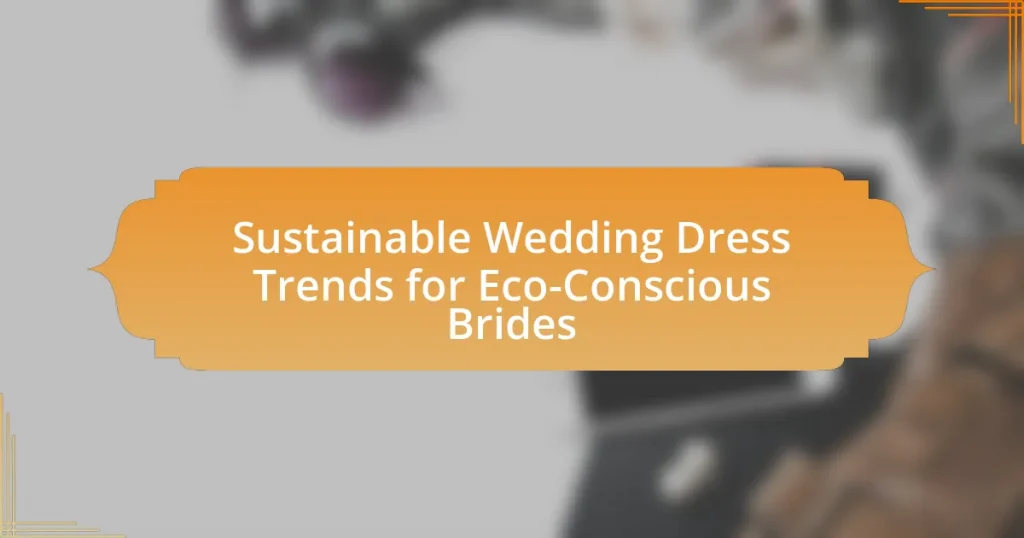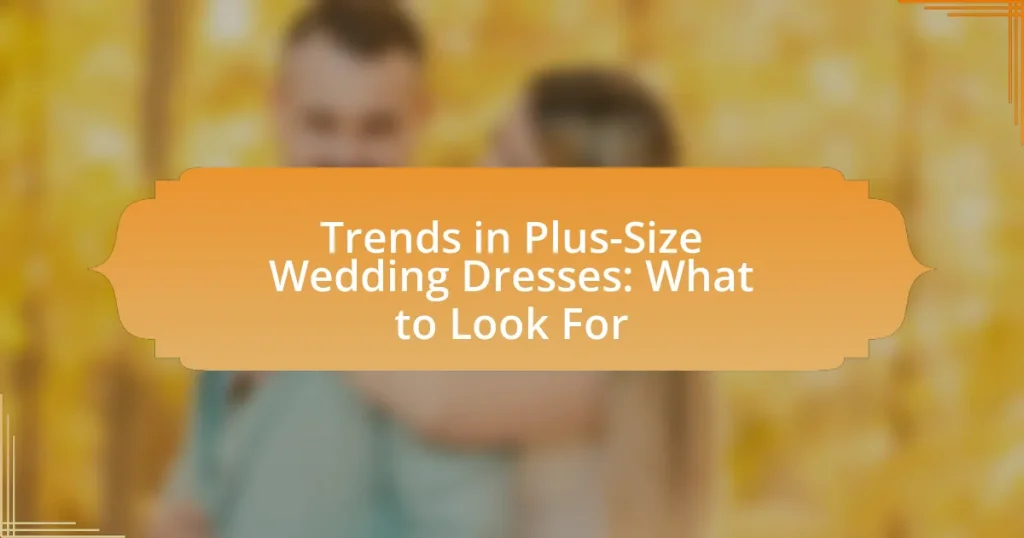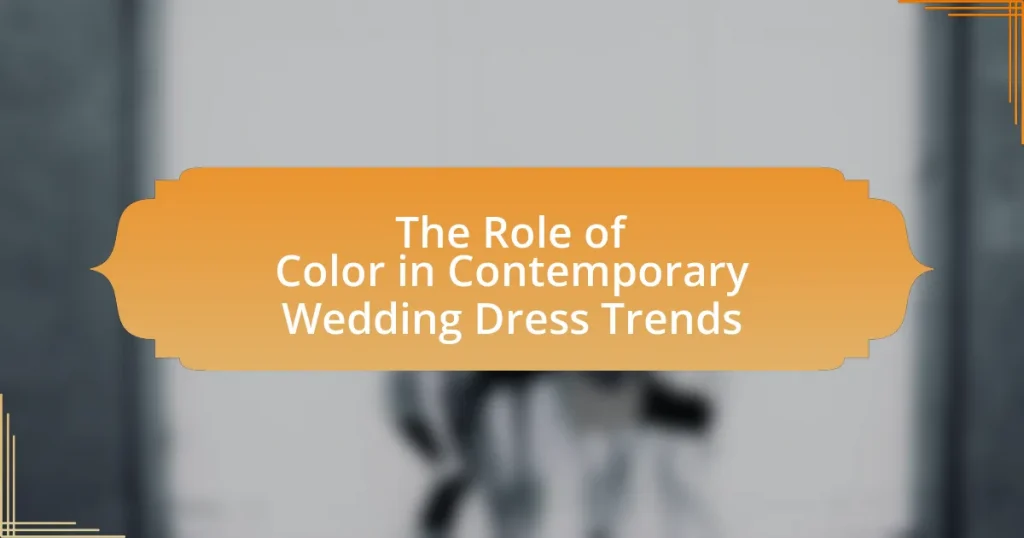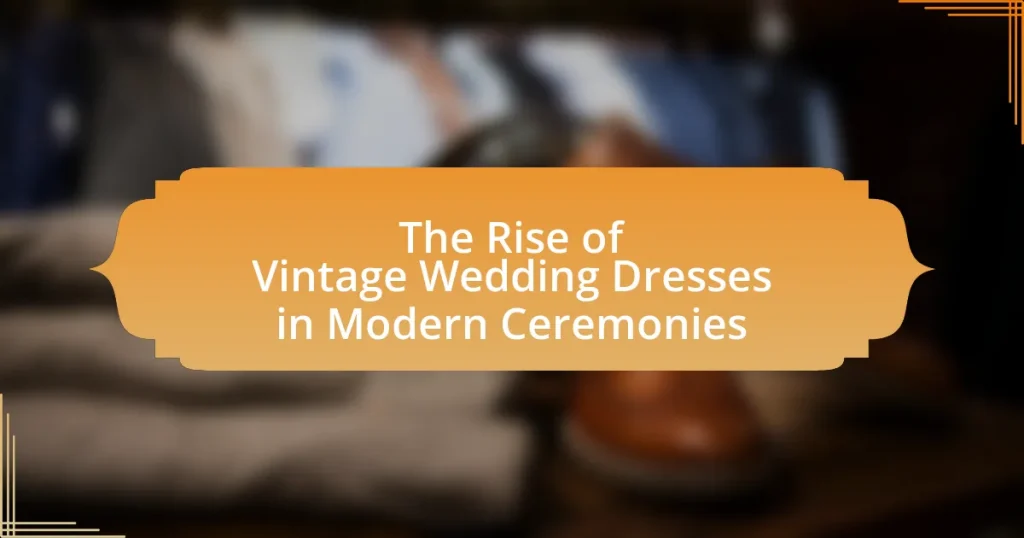Sustainable wedding dress trends for eco-conscious brides focus on environmentally friendly materials and ethical production practices. Key trends include the use of organic fabrics like cotton and hemp, vintage or second-hand dresses, and designs that minimize waste. The article explores how sustainable dresses differ from traditional options, the materials commonly used, and the impact of production processes on the environment. It also highlights the values prioritized by eco-conscious brides, the influence of sustainability on wedding planning, and practical tips for selecting a sustainable dress. Additionally, it addresses common misconceptions about sustainable fashion and provides insights on the durability and care of sustainable fabrics.
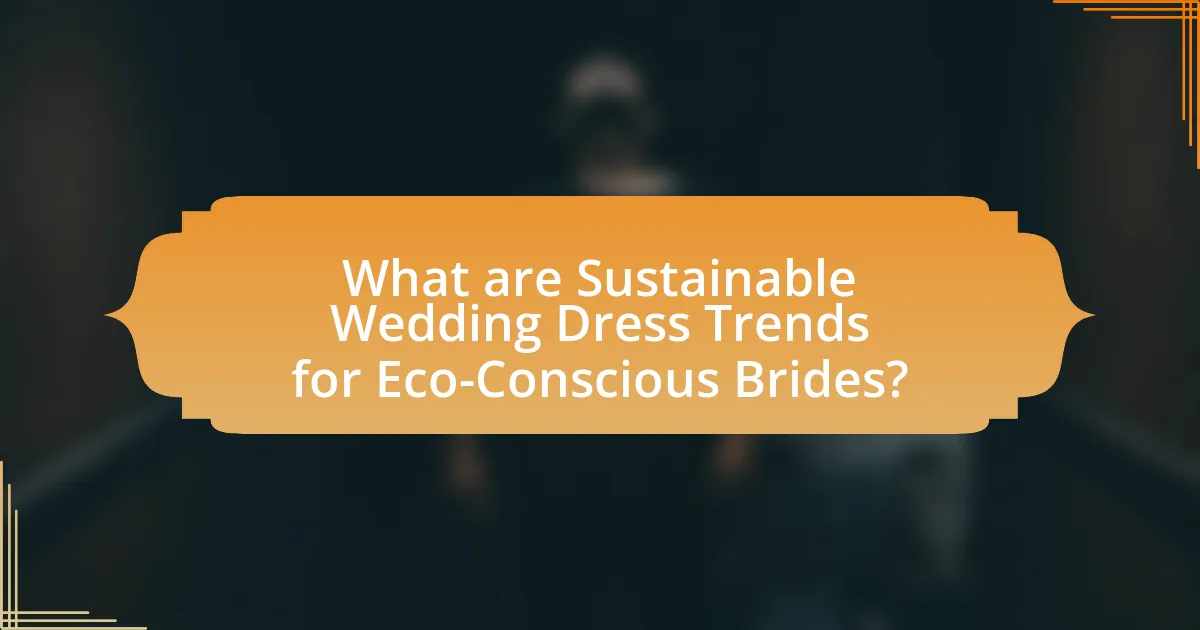
What are Sustainable Wedding Dress Trends for Eco-Conscious Brides?
Sustainable wedding dress trends for eco-conscious brides include the use of organic fabrics, vintage or second-hand dresses, and designs that prioritize minimal waste. Organic fabrics, such as organic cotton, hemp, and Tencel, are increasingly popular due to their lower environmental impact compared to conventional materials. Vintage or second-hand dresses not only reduce waste but also offer unique styles that can be more affordable. Additionally, many designers are adopting zero-waste patterns and sustainable production practices, which further align with eco-friendly values. According to a report by the Ellen MacArthur Foundation, the fashion industry is responsible for 10% of global carbon emissions, highlighting the importance of sustainable choices in wedding attire.
How do sustainable wedding dresses differ from traditional options?
Sustainable wedding dresses differ from traditional options primarily in their materials and production processes. Sustainable dresses are made from eco-friendly fabrics such as organic cotton, hemp, or recycled materials, which reduce environmental impact, while traditional dresses often use synthetic fabrics that contribute to pollution and waste. Additionally, sustainable options prioritize ethical labor practices, ensuring fair wages and safe working conditions, whereas traditional options may not guarantee such standards. According to a report by the Ethical Fashion Forum, the fashion industry is responsible for 10% of global carbon emissions, highlighting the importance of choosing sustainable alternatives to mitigate environmental harm.
What materials are commonly used in sustainable wedding dresses?
Sustainable wedding dresses commonly utilize materials such as organic cotton, hemp, linen, Tencel, and recycled fabrics. Organic cotton is grown without harmful pesticides, making it an eco-friendly choice. Hemp is a durable and biodegradable material that requires minimal water and no synthetic fertilizers. Linen, made from flax plants, is also biodegradable and has a low environmental impact. Tencel, produced from sustainably sourced wood pulp, is known for its softness and biodegradability. Recycled fabrics, including those made from post-consumer waste, help reduce landfill contributions and resource consumption. These materials collectively contribute to the sustainability of wedding dresses by minimizing environmental harm and promoting ethical production practices.
How does the production process of sustainable dresses impact the environment?
The production process of sustainable dresses positively impacts the environment by reducing waste, conserving resources, and minimizing carbon emissions. Sustainable dress production often utilizes organic or recycled materials, which decreases the reliance on harmful pesticides and synthetic fibers, thus lowering soil and water pollution. Additionally, sustainable practices such as local sourcing and ethical manufacturing reduce transportation emissions and support fair labor conditions. According to a report by the Ellen MacArthur Foundation, the fashion industry could reduce its greenhouse gas emissions by 30% by adopting circular economy principles, which are integral to sustainable dress production.
Why are eco-conscious brides choosing sustainable wedding dresses?
Eco-conscious brides are choosing sustainable wedding dresses to minimize their environmental impact and promote ethical fashion practices. This choice reflects a growing awareness of the negative effects of fast fashion, which contributes to pollution and waste. Sustainable wedding dresses are often made from eco-friendly materials, such as organic cotton or recycled fabrics, and are produced using ethical labor practices. According to a 2021 survey by The Knot, 40% of couples reported that sustainability was a key factor in their wedding planning, highlighting the increasing demand for environmentally responsible options in the bridal industry.
What values do eco-conscious brides prioritize in their wedding attire?
Eco-conscious brides prioritize sustainability, ethical sourcing, and minimal environmental impact in their wedding attire. These brides often seek dresses made from organic or recycled materials, ensuring that their choices support eco-friendly practices. Additionally, they value transparency in the supply chain, favoring designers who disclose their production methods and labor conditions. According to a survey by The Knot, 30% of brides consider sustainability a key factor in their wedding planning, reflecting a growing trend towards environmentally responsible choices in the wedding industry.
How does sustainability influence the overall wedding planning process?
Sustainability significantly influences the overall wedding planning process by prioritizing eco-friendly choices in various aspects, including venue selection, catering, and attire. Couples increasingly seek sustainable options, such as locally sourced flowers, organic catering, and eco-conscious wedding dresses, which reduces environmental impact. For instance, a survey by The Knot in 2021 revealed that 30% of couples considered sustainability when planning their weddings, indicating a growing trend towards environmentally responsible practices. This shift not only reflects personal values but also encourages vendors to adopt sustainable practices, creating a ripple effect throughout the wedding industry.
What are the latest trends in sustainable wedding dresses?
The latest trends in sustainable wedding dresses include the use of eco-friendly materials, such as organic cotton, hemp, and recycled fabrics, which minimize environmental impact. Designers are increasingly focusing on zero-waste patterns and upcycling vintage garments to create unique pieces, reflecting a commitment to sustainability. Additionally, many brands are adopting transparent supply chains, allowing consumers to understand the sourcing and production processes behind their dresses. According to a 2023 report by the Ethical Fashion Forum, the demand for sustainable wedding attire has risen by 30% in the past year, indicating a significant shift towards eco-conscious choices among brides.
Which styles are popular among eco-conscious brides today?
Popular styles among eco-conscious brides today include vintage-inspired gowns, bohemian designs, and minimalist silhouettes. Vintage-inspired gowns often utilize sustainable fabrics and can be sourced second-hand, reducing environmental impact. Bohemian designs emphasize natural materials and flowing lines, appealing to brides seeking a relaxed, earthy aesthetic. Minimalist silhouettes focus on simplicity and elegance, often made from organic or recycled materials, aligning with the eco-conscious ethos. These styles reflect a growing trend towards sustainability in the bridal fashion industry, as more brides prioritize ethical choices in their wedding attire.
How are designers innovating in the sustainable wedding dress market?
Designers are innovating in the sustainable wedding dress market by utilizing eco-friendly materials, such as organic cotton, recycled fabrics, and biodegradable textiles. This shift towards sustainability is driven by a growing consumer demand for environmentally responsible fashion, with a reported 70% of brides expressing interest in sustainable options. Additionally, designers are implementing zero-waste patterns and local production methods to minimize carbon footprints, further enhancing their commitment to sustainability. Brands like Reformation and Amsale exemplify this trend by offering collections that prioritize both style and environmental impact, showcasing the potential for elegance in eco-conscious design.
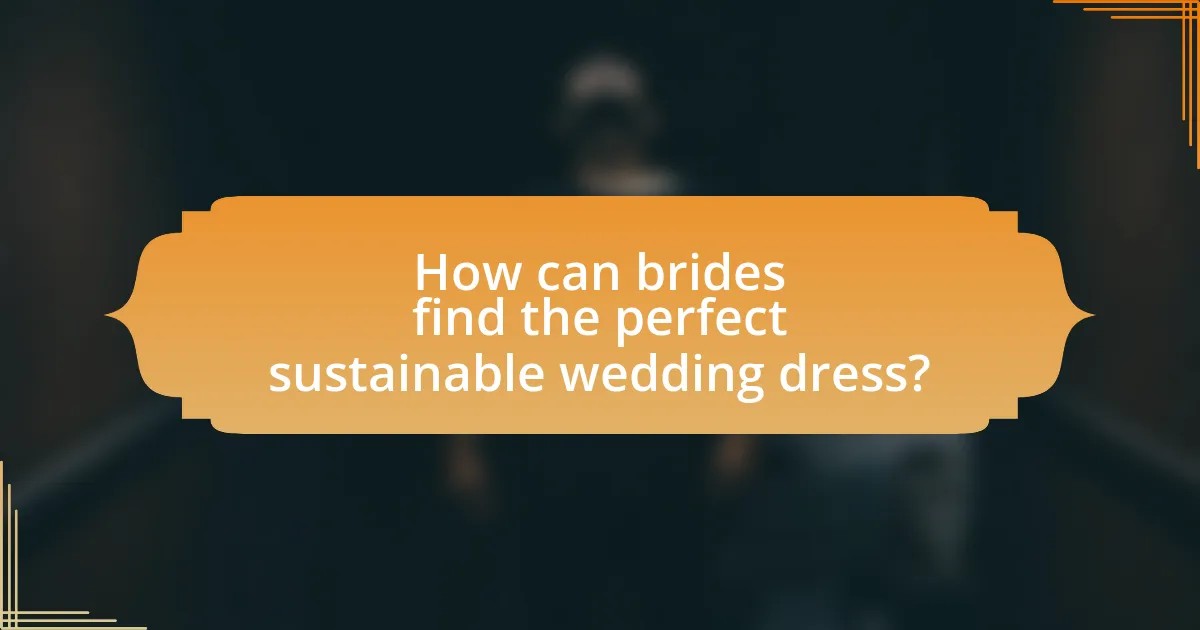
How can brides find the perfect sustainable wedding dress?
Brides can find the perfect sustainable wedding dress by researching designers who specialize in eco-friendly materials and practices. Many brands now offer dresses made from organic fabrics, recycled materials, or vintage garments, which significantly reduce environmental impact. For instance, designers like Reformation and BHLDN focus on sustainable production methods and transparency in sourcing. Additionally, brides can explore second-hand options through platforms like Stillwhite or local thrift shops, which promote circular fashion. Engaging with bridal boutiques that prioritize sustainability can also provide access to exclusive collections that align with eco-conscious values.
What factors should brides consider when selecting a sustainable dress?
Brides should consider the materials, production practices, and lifecycle of the dress when selecting a sustainable gown. Sustainable dresses often utilize organic fabrics, such as cotton or linen, which reduce environmental impact compared to conventional materials. Additionally, brides should evaluate the ethical practices of the manufacturer, ensuring fair labor conditions and minimal waste during production. The lifecycle of the dress, including options for recycling or resale after the wedding, also plays a crucial role in sustainability. According to a report by the Ellen MacArthur Foundation, the fashion industry contributes to 92 million tons of waste annually, highlighting the importance of making informed choices that minimize environmental harm.
How important is the dress’s lifecycle in the selection process?
The dress’s lifecycle is crucial in the selection process for eco-conscious brides. Understanding the lifecycle helps brides assess the environmental impact of their dress, from production to disposal. For instance, a study by the Ellen MacArthur Foundation highlights that the fashion industry contributes to 10% of global carbon emissions, emphasizing the importance of choosing dresses made from sustainable materials and designed for longevity. By considering the lifecycle, brides can make informed choices that align with their values of sustainability and reduce waste.
What role does budget play in choosing a sustainable wedding dress?
Budget significantly influences the selection of a sustainable wedding dress by determining the range of available options and the quality of materials used. A limited budget may restrict access to high-quality, ethically sourced fabrics and craftsmanship, which are essential for sustainability. For instance, sustainable wedding dresses often utilize organic materials or recycled fabrics, which can be more expensive than conventional options. According to a survey by The Knot, 45% of couples reported that budget constraints impacted their wedding attire choices, highlighting the importance of financial considerations in the decision-making process. Thus, the budget directly affects both the sustainability and overall aesthetic of the wedding dress.
Where can brides shop for sustainable wedding dresses?
Brides can shop for sustainable wedding dresses at specialized boutiques, online retailers, and eco-conscious designers. Notable options include brands like Reformation, which focuses on sustainable materials and ethical production practices, and BHLDN, which offers a selection of eco-friendly gowns. Additionally, platforms like Etsy feature independent designers who create custom, sustainable wedding dresses. These retailers often provide transparency about their sourcing and manufacturing processes, ensuring that brides can make informed choices aligned with their values.
What are some reputable brands known for sustainable wedding attire?
Reputable brands known for sustainable wedding attire include Reformation, which focuses on eco-friendly materials and ethical production practices, and BHLDN, offering a range of vintage-inspired gowns made from sustainable fabrics. Another notable brand is Grace Loves Lace, recognized for its use of organic lace and sustainable practices. Additionally, Made With Love Bridal emphasizes ethical manufacturing and uses eco-conscious materials. These brands have established a commitment to sustainability, evidenced by their transparent supply chains and environmentally friendly practices.
How can brides support local designers in their search for sustainable options?
Brides can support local designers in their search for sustainable options by prioritizing purchases from these artisans, thereby fostering local economies and promoting eco-friendly practices. By choosing to buy wedding dresses from local designers, brides not only reduce the carbon footprint associated with long-distance shipping but also encourage the use of sustainable materials and ethical production methods. Research indicates that local designers often utilize environmentally friendly fabrics and practices, which align with the values of eco-conscious brides. Supporting local businesses also helps to maintain traditional craftsmanship and ensures that the economic benefits remain within the community.
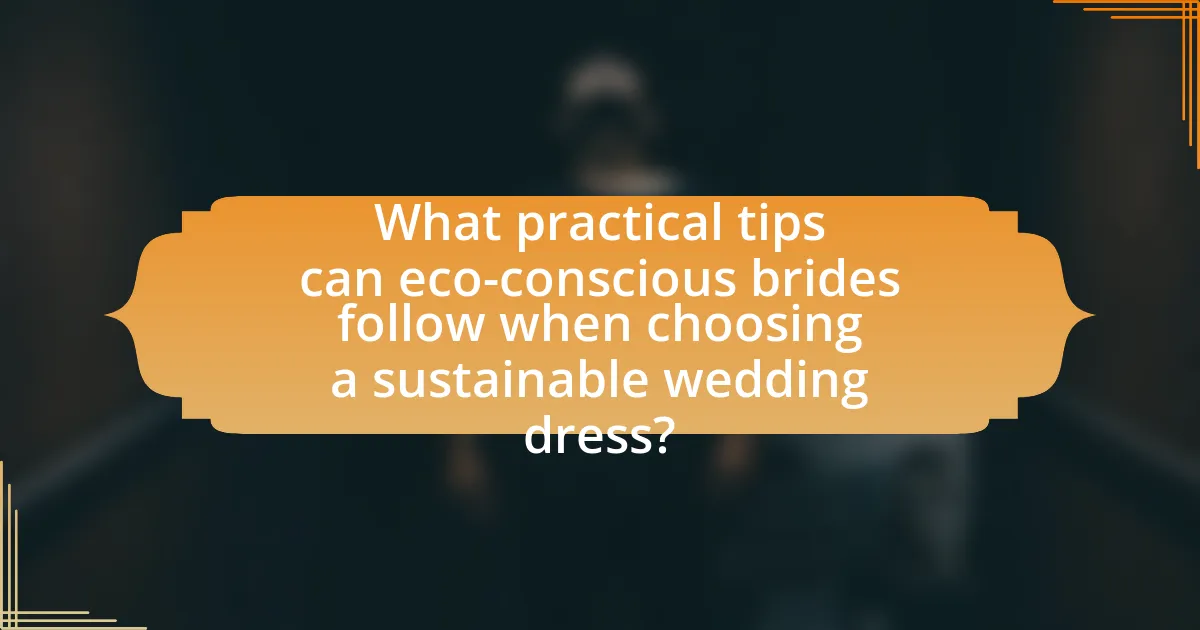
What practical tips can eco-conscious brides follow when choosing a sustainable wedding dress?
Eco-conscious brides can choose a sustainable wedding dress by prioritizing materials that are organic, recycled, or ethically sourced. Selecting fabrics like organic cotton, hemp, or Tencel reduces environmental impact, as these materials require less water and chemicals compared to conventional fabrics. Additionally, brides should consider purchasing from designers who practice ethical manufacturing, ensuring fair labor practices and minimal waste. Renting a dress or buying second-hand can also significantly lower the carbon footprint associated with new garment production. According to a study by the Ellen MacArthur Foundation, the fashion industry is responsible for 10% of global carbon emissions, highlighting the importance of sustainable choices.
How can brides ensure their dress is truly sustainable?
Brides can ensure their dress is truly sustainable by choosing materials that are eco-friendly, such as organic cotton, hemp, or recycled fabrics. These materials significantly reduce environmental impact compared to conventional fabrics, which often involve harmful chemicals and extensive water usage. Additionally, brides should consider purchasing from designers who prioritize ethical production practices, such as fair labor conditions and minimal waste. Research indicates that the fashion industry is responsible for 10% of global carbon emissions, highlighting the importance of sustainable choices. By opting for second-hand dresses or rental options, brides can further minimize their carbon footprint, as these practices extend the lifecycle of garments and reduce demand for new production.
What certifications should brides look for in sustainable wedding dresses?
Brides should look for certifications such as Global Organic Textile Standard (GOTS), OEKO-TEX Standard 100, and Fair Trade Certified when selecting sustainable wedding dresses. GOTS ensures that textiles are made from organic fibers and adhere to strict environmental and social criteria throughout the production process. OEKO-TEX Standard 100 certifies that fabrics are free from harmful substances, promoting safety for both the wearer and the environment. Fair Trade Certified indicates that the garment was produced under fair labor conditions, supporting ethical practices in the fashion industry. These certifications collectively provide assurance of sustainability and ethical sourcing in wedding dress options.
How can brides assess the environmental impact of their chosen dress?
Brides can assess the environmental impact of their chosen dress by evaluating the materials, production processes, and lifecycle of the garment. Specifically, they should consider whether the dress is made from sustainable fabrics, such as organic cotton or recycled materials, which have a lower environmental footprint compared to conventional fabrics. Additionally, brides should investigate the manufacturing practices of the designer or brand, looking for certifications like Fair Trade or GOTS (Global Organic Textile Standard) that indicate ethical production methods.
Furthermore, analyzing the dress’s lifecycle, including its potential for reuse or recycling, can provide insight into its overall sustainability. According to a study by the Ellen MacArthur Foundation, the fashion industry is responsible for 10% of global carbon emissions, highlighting the importance of making informed choices. By focusing on these factors, brides can make more eco-conscious decisions regarding their wedding attire.
What are some common misconceptions about sustainable wedding dresses?
Common misconceptions about sustainable wedding dresses include the belief that they are always more expensive, less stylish, and made from inferior materials. In reality, sustainable wedding dresses can be competitively priced, as many designers are now offering eco-friendly options that do not compromise on style or quality. For instance, brands like Reformation and BHLDN provide fashionable sustainable choices at various price points. Additionally, sustainable dresses often utilize high-quality, organic, or recycled materials, which can enhance durability and comfort. This counters the notion that eco-friendly options are of lower quality.
How can brides overcome the stigma associated with eco-friendly fashion?
Brides can overcome the stigma associated with eco-friendly fashion by showcasing the beauty and elegance of sustainable wedding attire. By selecting stylish designs made from organic or recycled materials, brides can demonstrate that eco-friendly options are not only environmentally responsible but also fashionable. Research indicates that the global sustainable fashion market is projected to reach $8.25 billion by 2023, reflecting a growing acceptance and demand for eco-conscious choices. Additionally, sharing personal stories about the importance of sustainability can inspire others and shift perceptions, as 66% of consumers are willing to pay more for sustainable brands.
What should brides know about the durability and care of sustainable fabrics?
Brides should know that sustainable fabrics, such as organic cotton, hemp, and Tencel, are generally durable and require specific care to maintain their quality. These fabrics often have natural resilience and can withstand wear, but they may require gentle washing methods, such as cold water and mild detergents, to prevent damage. For instance, organic cotton is known for its strength and breathability, while Tencel is praised for its moisture-wicking properties and softness. Proper care, including air drying instead of machine drying, can extend the lifespan of these materials, ensuring that the wedding dress remains in excellent condition for years to come.
